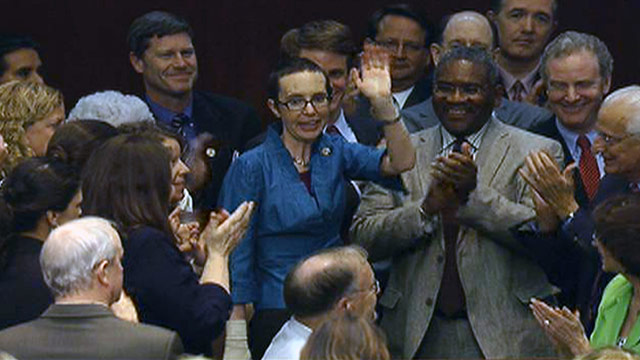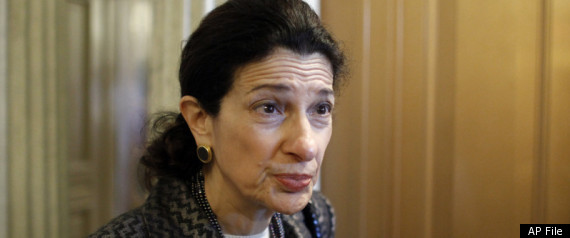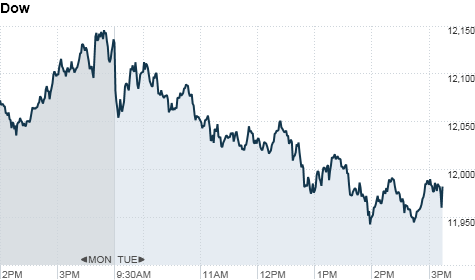By Alan Silverleib and Tom Cohen, CNN
August 2, 2011 3:03 p.m. EDT
-- President Barack Obama signed a last-minute compromise plan to raise the nation's $14.3 trillion debt ceiling Tuesday afternoon, narrowly averting what could have been an unprecedented default with calamitous economic consequences.
The U.S. Senate passed the plan, which imposes sweeping new spending cuts over the next decade, shortly after noon ET. The bill was approved in a 74-26 vote; 60 votes were required for passage.
The measure was approved by the House of Representatives on Monday by a 269-161 vote, overcoming opposition from unhappy liberal Democrats and tea party Republicans.
Obama praised the deal moments after the Senate passed it, calling the measure "an important first step for ensuring that as a nation we live within our means."
 Reid: Debt deal was a 'compromise'
Reid: Debt deal was a 'compromise'  Senate passes debt deal
Senate passes debt deal  House passes debt ceiling deal
House passes debt ceiling deal  House applauds Giffords' surprise return
House applauds Giffords' surprise return But the American economy "didn't need Washington to come along with a manufactured crisis," the president noted. "It's pretty likely that the uncertainty surrounding the raising of the debt ceiling -- for both businesses and consumers -- has been unsettling, and just one more impediment to the full recovery that we need. And it was something that we could have avoided entirely."
"Voters may have chosen divided government, but they sure didn't vote for dysfunctional government," the president said.
If the debt ceiling had not been increased before the end of Tuesday, Americans could have seen rapidly rising interest rates, a falling dollar and shakier financial markets, among other problems.
The end of the triple-A world
Regardless, the federal government could still face a credit rating downgrade.
The agreement -- reached Sunday by Obama and congressional leaders from both parties -- calls for up to $2.4 trillion in savings over the next decade, raises the debt ceiling through the end of 2012 and establishes a special congressional committee to recommend long-term fiscal reforms.
Emotions ran high during the final debates on Capitol Hill. Numerous Republicans remain worried about cuts in defense spending and the lack of a required balanced budget amendment to the Constitution. Progressive Democrats are livid over the extent of the deal's domestic spending cuts, as well as the absence of any immediate tax hikes on high-income Americans.
Debt ceiling: What the deal will do
"On this matter, my conscience is conflicted," Sen. Dick Durbin, D-Illinois, said Tuesday morning. "If we should default on our debt, terrible things will ensue." But if "we continue to move toward more and more spending cuts, we will literally disadvantage the poor and working families of America to the advantage of those who are well off."
But Sen. Mark Kirk, R-Illinois, praised the agreement, calling it "a down payment on further ways to bring common sense ... to the spending of our government,"
"If we fail, we deliver a free people into the hands of financial bondage," he warned.
Sen. Joe Lieberman, I-Connecticut, called the deal a first step in "a long, hard march back to fiscal responsibility in our country."
"Nobody seems perfectly satisfied with it, but that's inevitable," Lieberman said. "For me, the positive outweighs the negative."
What's your message to Congress and the White House?
 Giffords' special appearance
Giffords' special appearance  Tea party goes from 'Hobbits' to winners
Tea party goes from 'Hobbits' to winners  Rep. Walsh: Debt bill not bold enough
Rep. Walsh: Debt bill not bold enough  The debt rhetoric: How we got here
The debt rhetoric: How we got here GOP leaders sold the deal to skeptical rank-and-file Republicans in recent days by arguing that it will finally begin the process of reforming spending and taming the growing debt, a key goal of conservatives who fueled the GOP takeover of the House in last year's midterm elections.
Top Democrats have focused on the fact that the bill preserves benefits from popular entitlement programs such as Medicare and takes the politically problematic debt ceiling issue off the table until 2013.
In the end, the majority of both Democrats and Republicans supported the legislation in the Senate.
In the House, Speaker John Boehner, R-Ohio, was able to round up the support of most of his GOP caucus, while the chamber's two top Democrats -- Minority Leader Nancy Pelosi of California and Minority Whip Steny Hoyer of Maryland -- voted for the plan along with more than 90 of their caucus members.
One of those supporting the plan was Rep. Gabrielle Giffords, D-Arizona, who cast her first House vote since being shot in the head in an assassination attempt in January. She received an emotional ovation when she entered the chamber.
Giffords' return to Congress sparks re-election talk
The final agreement revolves around a two-stage process.
The first stage includes $917 billion in savings, including a roughly $420 billion reduction in the national security budget. The cuts would be accompanied by a $900 billion increase in the debt ceiling.
Because of the pending Tuesday deadline, Obama would have immediate authority to raise the debt ceiling by $400 billion, which will last through September, according to the White House.
The other $500 billion increase in the debt limit would be subject to a congressional vote of disapproval that can be vetoed by Obama.
Debt bill cheat sheet
In the second stage, a special joint committee of Congress would recommend further deficit reduction steps totaling $1.5 trillion or more, with Congress obligated to vote on the panel's proposals by the end of the year.
The committee would comprise 12 members, six from each chamber, equally divided between Democrats and Republicans. The panel's recommendations would be due by November 23 and guaranteed an up-or-down vote without amendments by December 23.
The committee is expected to consider politically sensitive reforms to the tax code and entitlement programs, though Democrats and Republicans disagree on the likelihood of any eventual revenue increases.
 The debt debate through historical lens
The debt debate through historical lens  Winners and losers of the debt deal
Winners and losers of the debt deal  What debt deal means for you
What debt deal means for you If the committee's recommendations are enacted, Obama would be authorized to increase the debt ceiling by up to $1.5 trillion. If the recommendations are not enacted, Obama can still raise the debt ceiling by $1.2 trillion. At that point, however, a budget "trigger" would kick in, imposing mandatory across-the-board spending cuts matching the size of the debt ceiling increase.
The cuts would be split between defense spending and non-defense programs, an unpopular formula intended to motivate legislators to approve the committee's recommendations.
"You want to make it hard for (lawmakers) just to walk away and wash their hands," Gene Sperling, the director of Obama's National Economic Council, said Sunday. "You want them to say, if nothing happens, there will be a very tough degree of pain that will take place."
The final debt ceiling increase in the agreement would also be subject to a congressional vote of disapproval that can be vetoed by Obama.
The agreement calls for both houses of Congress to vote on a balanced budget amendment to the Constitution, though it does not make a further increase in the debt limit subject to congressional passage of such an amendment -- something tea party conservatives were initially demanding.
Leaders on both sides of the aisle have openly conceded that the deal is far from perfect.
"Neither side got what they wanted," Senate Majority Leader Harry Reid, D-Nevada, said Tuesday. "Each side laments some of the things we had to give up, but that's the way it is."
A new CNN/ORC International Poll shows that only 44% of Americans approve of the debt ceiling deal, while 52% disapprove.
Debt deal: We can, and must, do better
According to the Monday survey, Republicans dislike the fact that the deal raises the debt ceiling through 2013, while Democrats dislike the lack of any tax increases on businesses or higher-income Americans.
Only 17% of Americans believe that their elected officials have behaved like "responsible adults" during the debt ceiling debate, while 77% believe they have acted like "spoiled children."
What will restore faith in lawmakers? 
"I think all of us need to reflect on how these institutions are conducting themselves, how members are conducting themselves," Sen. Kent Conrad, D-North Dakota, said Tuesday.
"We need to think about why are we really here. We're here to solve problems. We're not here to worry about the next election, and unfortunately there's too much focus on pure partisan politics and not enough focus on solving problems confronting the country."
CNN's Ted Barrett, Kate Bolduan, Gloria Borger, Keating Holland, Brianna Keilar, Jeanne Sahadi, Xuan Thai, Jessica Yellin, Athena Jones, Lisa Desjardins, Dan Lothian and Deirdre Walsh contributed to this report.




























